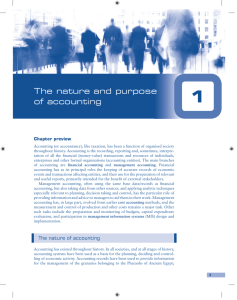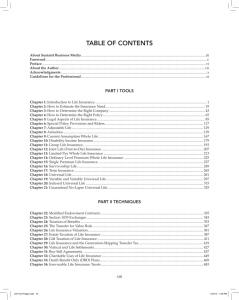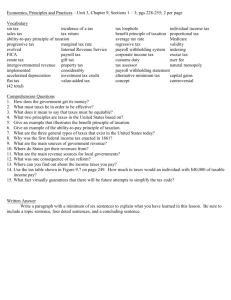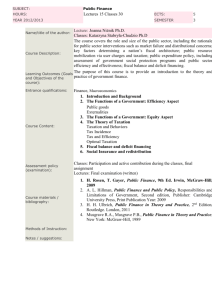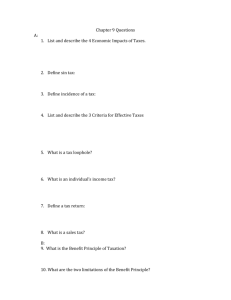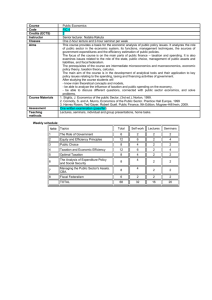C2-1 Taxation of Business Entities
advertisement
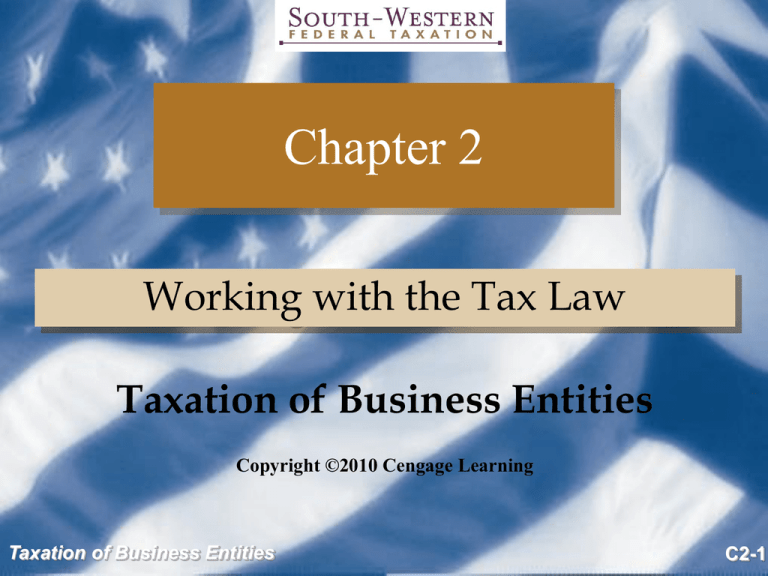
Chapter 2 Working with the Tax Law Taxation of Business Entities Copyright ©2010 Cengage Learning Taxation of Business Entities C2-1 Statutory Sources of Tax Law (slide 1 of 2) • Internal Revenue Code – Codification of the Federal tax law provisions in a logical sequence – Have had three codes: • 1939, 1954, 1986 Taxation of Business Entities C2-2 Statutory Sources of Tax Law (slide 2 of 2) • Example of Code Citation: § 2(a)(1)(A) 2 = section number (a) = subsection (1) = paragraph designation (A) = subparagraph designation Taxation of Business Entities C2-3 Legislative Process For Tax Bills Taxation of Business Entities C2-4 Tax Treaties • The U.S. signs tax treaties with foreign countries to: • Render mutual assistance in tax enforcement • Avoid double taxation • Neither a tax law nor a tax treaty takes general precedence • When there is a direct conflict, the most recent item will take precedence • A taxpayer must disclose on the tax return any position where a treaty overrides a tax law Taxation of Business Entities C2-5 Administrative Sources of Tax Law • Treasury Department Regulations • Revenue Rulings • Revenue Procedures, and • Various other administrative pronouncements Taxation of Business Entities C2-6 Regulations (slide 1 of 4) – Issued by U.S. Treasury Department – Provide general interpretations and guidance in applying the Code Taxation of Business Entities C2-7 Regulations (slide 2 of 4) • Issued as: – Proposed: preview of final regulations • Do not have force and effect of law – Temporary: issued when guidance needed quickly • Same authoritative value as final regulations – Final: • Force and effect of law Taxation of Business Entities C2-8 Regulations (slide 3 of 4) • Example of Regulation citation: – Reg. § 1.2 • Refers to Regulations under Code § 2 • Subparts may be added for further identification • The numbering patterns of these subparts often have no correlation with the Code subsections Taxation of Business Entities C2-9 Regulations (slide 4 of 4) • Example of Proposed Regulation citation: Prop. Reg. § 1.2 • Example of Temporary Regulation citation: Temp. Reg. § 1.199–8T Taxation of Business Entities C2-10 Revenue Rulings (slide 1 of 2) • Officially issued by National Office of IRS – Provide specific interpretations and guidance in applying the Code – Less legal force than Regulations – Issued in IRB and accumulated in the Cumulative Bulletins Taxation of Business Entities C2-11 Revenue Rulings (slide 2 of 2) • Example of Temporary Revenue Ruling citation – Rev.Rul. 2008–16, I.R.B. No. 11, 585 • Explanation: Revenue Ruling Number 16, appearing on page 585 of the 11th weekly issue of the Internal Revenue Bulletin for 2008 • Example of Permanent Revenue Ruling citation – Rev.Rul. 2008–16, 2008–1 C.B. 585 • Explanation: Revenue Ruling Number 16, appearing on page 585 of Volume 1 of the Cumulative Bulletin for 2008 Taxation of Business Entities C2-12 Revenue Procedures (slide 1 of 2) • Concerned with the internal procedures of IRS – Issued similar to Revenue Rulings – Issued in IRB and accumulated in the Cumulative Bulletins Taxation of Business Entities C2-13 Revenue Procedures (slide 2 of 2) • Example of Revenue Procedure citation – Rev. Proc. 92-29, 1992-1 CB 748 • 29th Rev. Procedure in 1992 found in volume 1 of Cumulative Bulletin on page 748 Taxation of Business Entities C2-14 Letter Rulings (slide 1 of 2) • Provide guidance to taxpayer on how a transaction will be taxed before proceeding with it – Issued for a fee upon a taxpayer's request – Describe how the IRS will treat a proposed transaction • Apply only to the taxpayer who asks for and obtains the ruling – Post-1984 letter rulings may be substantial authority for purposes of the accuracy-related penalty • Limited to restricted, preannounced areas of taxation Taxation of Business Entities C2-15 Letter Rulings (slide 2 of 2) • Example of Letter Ruling citation – Ltr.Rul. 200804004 • 4th ruling issued in the 4th week of 2008 Taxation of Business Entities C2-16 Other Administrative Pronouncements (slide 1 of 3) • Treasury Decisions-issued by Treasury Dept. to: – Promulgate new or amend existing Regulations – Announce position of the Government on selected court decisions – Published in the Internal Revenue Bulletin • Then transferred to the Cumulative Bulletin Taxation of Business Entities C2-17 Other Administrative Pronouncements (slide 2 of 3) • Determination Letters – Issued by Area Director at taxpayer’s request – Usually involve completed transactions – Not published • Made known only to party making the request Taxation of Business Entities C2-18 Other Administrative Pronouncements (slide 3 of 3) • General Counsel Memoranda • Technical Advice Memoranda • Field Service Advice Taxation of Business Entities C2-19 Federal Judicial System Taxation of Business Entities C2-20 Judicial Sources (slide 1 of 2) • There are four courts of original jurisdiction (trial courts) – – – – U.S. Tax Court: Regular U.S. Tax Court: Small Cases Division Federal District Court U.S. Court of Federal Claims Taxation of Business Entities C2-21 Judicial Sources (slide 2 of 2) U.S. Court of Issue Number of judges per court U.S. Tax Court 19* U.S. District Court Varies Federal Claims 16 Payment of deficiency before trial No Yes Yes Jury trial No Yes No Types of disputes Tax cases only Most criminal and civil issues Claims against the United States Jurisdiction Nationwide Location of Taxpayer Nationwide IRS acquiescence policy Yes Yes Yes Appeal route U.S. Court of Appeals U.S. Court of Appeals for the Federal Court U.S. Court of Appeals . *There are also 14 special trial judges and 9 senior judges. Taxation of Business Entities C2-22 Appeals Process • Appeals from District Court or Tax Court go to the U.S. Court of Appeals for circuit where taxpayer resides • Appeals from Court of Federal Claims is to Court of Appeals for the Federal Circuit • Appeal to the Supreme Court is by Writ of Certiorari – Only granted for those cases it desires to hear Taxation of Business Entities C2-23 Courts’ Weights As Precedents • From high to low – Supreme Court – Circuit Court of Appeals – Tax Court (Regular), U.S. Court of Federal Claims, & U.S. District Courts • Decisions of Small Cases Division of Tax Court have no precedential value and cannot be appealed Taxation of Business Entities C2-24 Tax Court (slide 1 of 3) • Issues two types of decisions: Regular and Memorandum – Regular decisions involve novel issues not previously resolved by the court • Regular decisions are published by the U.S. government, for example Taxation of Business Entities C2-25 Tax Court (slide 2 of 3) • Tax Court Memorandum decisions – Memorandum decisions deal with situations necessitating only the application of already established principles of law – Memorandum decisions were not published by the U.S. Government until recently • They are currently published on the U.S. Tax Court Web site Taxation of Business Entities C2-26 Tax Court (slide 3 of 3) • Memorandum decisions were—and continue to be—published by several tax services – Consider, for example, three different ways that Jack D. Carr can be cited: • Jack D. Carr, TC Memo 1985-19 • Jack D. Carr, 49 TCM 507 (CCH citation) • Jack D. Carr, RIA TC Mem. Dec. ¶85, 019 (RIA citation) Taxation of Business Entities C2-27 Examples Of District Court Decision Citations • Examples of citations – Simmons-Eastern v. U.S., 73-1 USTC ¶9279 (D.Ct. Ga., 1972) (CCH citation) – Simmons-Eastern v. U.S., 31 AFTR2d 73-640 (D.Ct. Ga., 1972) (RIA citation) – Simmons-Eastern v. U.S., 354 F. Supp. 1003 (D.Ct. Ga., 1972) (West citation) Taxation of Business Entities C2-28 Supreme Court Decisions • Examples of citations – U.S. v. The Donruss Co., (USSC, 1969) • • • • • 69-1 USTC ¶9167 (CCH citation) 23 AFTR2d 69-418 (RIA citation) 89 S. CT 501 (West citation) 393 U.S. 297 (U.S. Government citation) 21 L.Ed.2d 495 (Lawyer's Co-operative Publishing Co. citation) Taxation of Business Entities C2-29 Tax Research Process Taxation of Business Entities C2-30 Tax Services • May be in electronic or paper form – Key research tools for the tax practitioner • The major tax services available include: – – – – – – – Standard Federal Tax Reporter, CCH United States Tax Reporter, RIA Federal Tax Coordinator 2d, RIA Tax Management Portfolios, BNA Federal Income, Gift and Estate Taxation, WG &L CCH’s Tax Research Consultant, CCH Mertens Law of Federal Income Taxation, Callaghan and Co. Taxation of Business Entities C2-31 Assessing The Validity Of Tax Law Sources (slide 1 of 4) • Regulations – IRS agents must give the Code and the Regulations equal weight when dealing with taxpayers and their representatives – Proposed Regulations are not binding on IRS or taxpayer – Burden of proof is on taxpayer to show Regulation incorrect Taxation of Business Entities C2-32 Assessing The Validity Of Tax Law Sources (slide 2 of 4) • Final Regulations tend to be of three types – Procedural: housekeeping-type instructions – Interpretive: rephrase what is in Committee Reports and the Code • Hard to get overturned – Legislative: allow the Treasury Department to determine the details of law • Congress has delegated its legislative powers and these cannot generally be overturned Taxation of Business Entities C2-33 Assessing The Validity Of Tax Law Sources (slide 3 of 4) • Revenue Rulings – Carry less weight than Regulations – Not substantial authority in court disputes Taxation of Business Entities C2-34 Assessing The Validity Of Tax Law Sources (slide 4 of 4) • Judicial sources – Consider the level of the court and the legal residence of the taxpayer – Determine whether the decision has been overturned on appeal Taxation of Business Entities C2-35 Tax Law Sources (slide 1 of 2) • Primary sources of tax law include: – – – – – – – The Constitution Legislative history materials Statutes Treaties Treasury Regulations IRS pronouncements, and Judicial decisions • In general, the IRS considers only primary sources to constitute substantial authority Taxation of Business Entities C2-36 Tax Law Sources (slide 2 of 2) • Secondary Sources include: – – – – – Legal periodicals Treatises Legal opinions General Counsel Memoranda, and Written determinations • In general, secondary sources are not authority Taxation of Business Entities C2-37 Tax Research (slide 1 of 2) • A crucial part of the research process is the ability to locate appropriate sources of the tax law – Both electronic and paper-based research tools are available to aid in this search Taxation of Business Entities C2-38 Tax Research (slide 2 of 2) • Computerized tax research tools have replaced paper resources in most tax practices – There are two chief ways to conduct tax research using computer resources: • Online and CD-ROM subscription services and • Online free Internet sites Taxation of Business Entities C2-39 Electronic Tax Research (slide 1 of 3) • CD-ROM Services – CCH, RIA, and WESTLAW offer vast tax libraries – Provide search and browsing capabilities for various tax databases and links to tax documents Taxation of Business Entities C2-40 Electronic Tax Research (slide 2 of 3) • On-Line Systems – Lexis/Nexis, CCH, RIA, and WESTLAW provide virtually instantaneous use of tax law sources – May be expensive but provides extremely current information Taxation of Business Entities C2-41 Electronic Tax Research (slide 3 of 3) • The Internet provides a wealth of tax information – Information available on web pages of accounting and consulting firms, publishers, tax academics, libraries, and governmental bodies – Newsgroups and email capabilities provide opportunities to exchange tax information Taxation of Business Entities C2-42 Taxation on the CPA Examination • Taxation is included in the 3-hour Regulation section and covers: – – – – Federal tax procedures and accounting issues Federal taxation of property transactions Federal taxation—individuals Federal taxation—entities • Knowledge is tested using both multiple-choice questions and case studies called simulations Taxation of Business Entities C2-43 If you have any comments or suggestions concerning this PowerPoint Presentation for South-Western Federal Taxation, please contact: Dr. Donald R. Trippeer, CPA trippedr@oneonta.edu SUNY Oneonta Taxation of Business Entities C2-44
